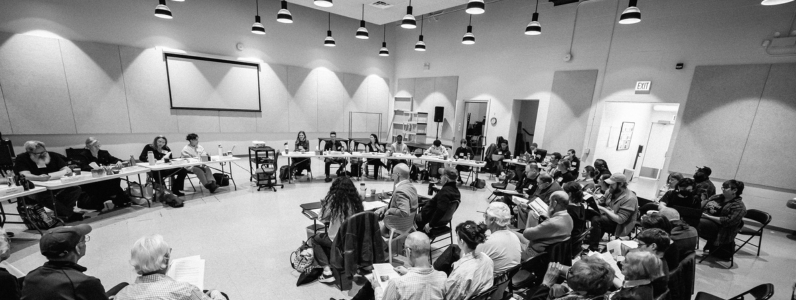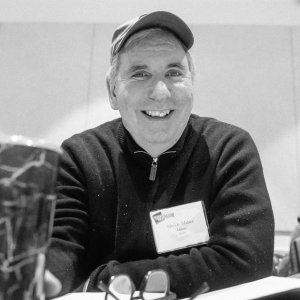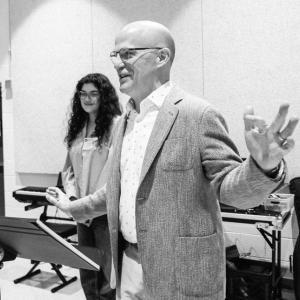In Conversation: Charles Newell and Mickle Maher

Charles Newell and Mickle Maher have never experienced anything quite like Berlin, and they’ve been in this industry for decades.
Associate Director of Marketing Camille Oswald sat down with the director and adaptor of Jason Lutes’s acclaimed graphic novel to discuss their collaborative history and the excitement, challenges, and opportunities inherent in adapting a graphic novel for the stage. Read on to learn more and join us on the tightrope.
What has the creative process been like so far?
Mickle: This creative process thus far is probably the longest creative process I’ve ever been a part of for a single project—four or five years now? Have you ever been involved in something this long?
Charlie: I’ve worked on projects over longer periods, but the quality of the transformation in our journey has been more than anything I’ve ever experienced: what we thought it was going to be, what it is now becoming, and what it might be once we open. We were so fortunate to have a playwright who would want to keep iterating, to create something transformationally different than what it was.

Mickle: It took so long to get it to anything resembling something that we would want to do! Adapting graphic novels isn’t done very often, and this is a really long graphic novel [laughs]. This is an epic thing. The challenge of this graphic novel is its length; it took Jason 20 years to write, it’s over 500 pages long, and it has dozens of major and minor characters. It requires some amount of distillation. I don’t know why there aren’t more stage adaptations of graphic novels, because they’re adapted for film all the time: Marvel, Scott Pilgrim, Ghost World. There’s a whole catalog of stories [that have been] visually imagined already, so I don’t know why they haven’t been [adapted for] the stage, but they haven’t. There’s Fun Home, of course, but other than that, I do feel like we’re pioneers in that respect.
Charlie: There’s a theme throughout the entire novel about perspective, and depth, and layering, so the design was deeply informed by this idea of, How do you take what a graphic novel is uniquely capable of doing, and translate that into something specific to the theatre? And that, to me, is thrilling. I am a restless spirit who doesn’t like doing what I’ve already done. I am mostly driven by, How do I get in the room with amazingly creative people and do something that I—and they—have never done together?
Mickle: Every other play that I’ve ever written, I could envision how it would be staged. This is the exception to that rule. We are in uncharted territory here—there’s a feeling of risk and of being on the tightrope. You really could see a million different ways in which it could be staged, a million different aesthetic choices before you, in a way that’s just not true of other plays that I’ve worked on, and I would say, not true of 90% of theatre out there. It’s not clear exactly how to stage this, which actually—much to my surprise and delight—the designers seemed excited by.

Charlie: The metaphor of a river is consistent throughout Lutes’s text; the presence, identity, and energy of trains coming and going constantly, and people crossing complicated landscapes (both literal and metaphoric, emotional landscapes), so— and this is probably no surprise to folks who know Court’s work—there is a goal that we never stop moving. We don’t settle anywhere because the text doesn’t.
Mickle: Berlin at the end of the Weimar period is this almost Oz-like, magical place, where we just imagine the greatest artists and musicians, theater directors, film directors converging for all sorts of complicated historical reasons in one place. Imagining how exciting that was, and how dynamic and how electric, and how complicated and all that, has turned the Berlin of that time—in our collective, cultural mind—into a romanticized place of incredible energy; an almost magical-beyond-belief energy right before the worst of the worst thing happens.
The last time that you both collaborated was in 2004 on Cyrano, almost exactly 20 years ago. What is it like to work together again?
Charlie: There’s 20 years of experience between us, and now we have a wisdom of process that I certainly didn’t have back then. The idea that we could now take on something this ambitious is terrifying and wonderful. That’s a good place to be.
Mickle: I get excited by seeing actors, and designers, and directors take on difficult things. So whether or not any given production succeeds, there is this other drama going on, just seeing twelve of the best actors in Chicago go up there, and do, and be stretched to their limits in a way that is quite obvious. You’ll see them in the first five minutes, you’ll be like, Oh my god, they’re doing something that I’ve never seen actors quite do before. It’s that excitement of seeing some of the best artists in town be challenged to their fullest extent.
Charlie: The ambition behind this production is unlike any I have ever experienced. Imagine what it would be like to be an actor in something like this! I’m so optimistic about what the experience will be like for an audience sitting in Court Theatre’s intimate space, and I imagine that, for an audience member, the energy onstage will be unlike anything you’ve seen before. The best theatre experience is when you get completely pulled in, and you’re not looking at a product that has been shaped and crafted for you to easily digest; rather, you’re seeing spontaneity being made up in every single moment, and you can’t take your eyes away.
Mickle: We’ve been working at this game for a long time; trust us when we say, this is different than anything else we’ve ever done.
Charlie: Join us on the tightrope. [laughs]
Join us in Berlin and don’t miss this exhilarating world premiere, onstage from April 19 – May 11, 2025. Tickets are available online or by calling the Box Office at (773) 753-4472.